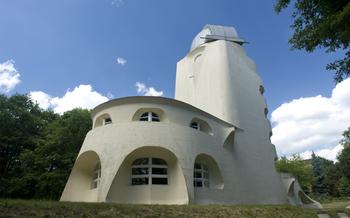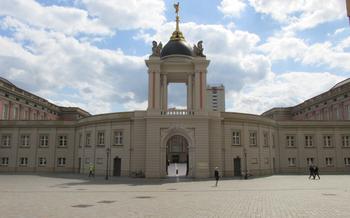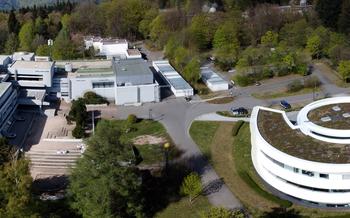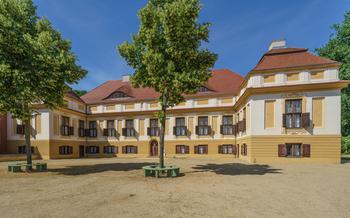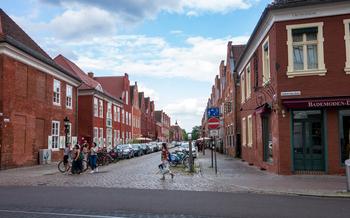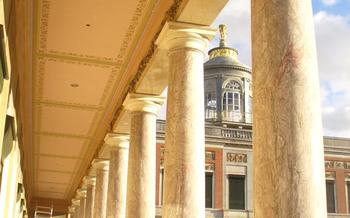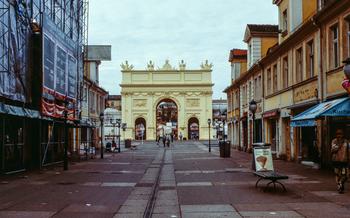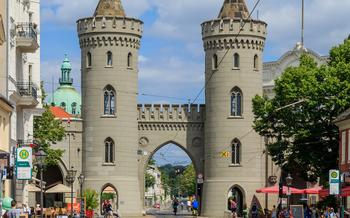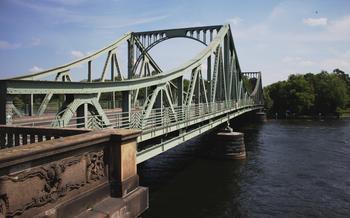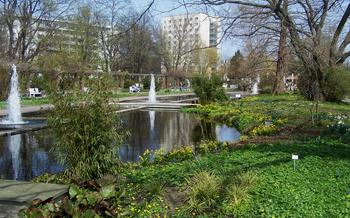
The Leibniz Institute for Astrophysics Potsdam (AIP)
- The Leibniz Institute for Astrophysics Potsdam (AIP)
- Exploring the Cosmos: Research at AIP
- The Large Binocular Telescope (LBT): A Window to the Universe
- The Einstein Tower: A Legacy of Scientific Genius
- Public Outreach and Education at AIP
- The AIP Campus: A Hub of Scientific Activity
- The Potsdam Observatory: A Historic Landmark
- The AIP Library: A Treasure Trove of Knowledge
- The Hermann-von-Helmholtz-Zentrum Berlin (HZB): A Collaborative Endeavor
- The Max Planck Institute for Gravitational Physics (MPG): A Renowned Neighbor
- The Potsdam Science Park: A Thriving Community
- Getting to AIP: Transportation Options
- Accommodation near AIP: Where to Stay
- Things to Do in Potsdam: Beyond AIP
- The AIP Cafeteria: A Unique Dining Experience
The Leibniz Institute for Astrophysics Potsdam (AIP)
The Leibniz Institute for Astrophysics Potsdam (AIP) is a world-renowned research institution dedicated to exploring the mysteries of the universe. Founded in 1992, the AIP has a rich history of groundbreaking discoveries and significant contributions to our understanding of the cosmos.
Located in the picturesque city of Potsdam, Germany, the AIP is easily accessible by public transport and car. The institute's proximity to Berlin, the German capital, provides a vibrant scientific and cultural environment.
The AIP's research encompasses a wide range of astrophysical disciplines, including observational astronomy, theoretical astrophysics, high-energy astrophysics, and planetary science. With its state-of-the-art facilities and a team of highly skilled researchers, the AIP is at the forefront of astrophysical research.
The institute fosters collaborations and partnerships with leading research institutions worldwide, ensuring access to the latest technologies and expertise. Through these collaborations, the AIP contributes to international scientific endeavors and plays a vital role in advancing our knowledge of the universe.
Exploring the Cosmos: Research at AIP
The Leibniz Institute for Astrophysics Potsdam (AIP) is a renowned center for astronomical research, encompassing a wide range of fields within astrophysics. Its astronomers delve into the mysteries of the cosmos, employing advanced observational techniques and theoretical modeling to unravel the secrets of the universe.
Observational astronomy forms a cornerstone of AIP's research, with astronomers utilizing state-of-the-art telescopes and instruments to gather data from across the electromagnetic spectrum. They study the properties of stars, galaxies, and other celestial objects, measuring their brightness, temperature, and composition.
Theoretical astrophysics complements observational studies, providing a framework for interpreting the vast amount of data collected. AIP's theorists develop mathematical models to simulate the behavior of stars, galaxies, and the universe as a whole. They explore topics such as stellar evolution, black hole formation, and the origin and evolution of galaxies.
High-energy astrophysics investigates the most energetic phenomena in the universe, such as supernova explosions, gamma-ray bursts, and active galactic nuclei. AIP's researchers study these extreme events using telescopes and instruments designed to detect X-rays, gamma rays, and other high-energy radiation.
Planetary science at AIP focuses on the study of planets, moons, and other small bodies in our solar system and beyond. Researchers investigate the formation and evolution of planets, their atmospheres and interiors, and the potential for life beyond Earth. They also study the interactions between planets and their host stars, as well as the dynamics of planetary systems.
The Large Binocular Telescope (LBT): A Window to the Universe
The Large Binocular Telescope (LBT) is a revolutionary astronomical instrument located on Mount Graham in Arizona, USA. It is operated by a consortium of institutions, including the Leibniz Institute for Astrophysics Potsdam (AIP). The LBT is unique in its design, featuring two 4-meter primary mirrors mounted on a single mount. This innovative configuration allows the LBT to achieve a resolving power equivalent to a single 28-meter telescope.
The LBT has been used to make groundbreaking discoveries in astronomy, including the detection of the most distant galaxies ever observed and the imaging of the first black hole. It has also been used to study the atmospheres of exoplanets, search for gravitational waves, and investigate the properties of dark matter.
The LBT is a powerful tool for astronomers around the world. It has been used by researchers from over 20 countries, and it has produced over 1,000 scientific publications. The LBT continues to push the boundaries of astronomical research, and it is expected to make even more exciting discoveries in the years to come.
In addition to its scientific discoveries, the LBT has also had a significant impact on public outreach and education. The LBT has hosted numerous public observing nights, workshops, and lectures. It has also developed educational materials for schools and universities. The LBT is committed to sharing the wonders of the universe with people of all ages.
The Einstein Tower: A Legacy of Scientific Genius
A visit to Potsdam is incomplete without exploring the iconic Einstein Tower, a beacon of scientific genius and architectural marvel. Built between 1919 and 1924, this cylindrical tower was designed by renowned architect Erich Mendelsohn, in collaboration with Albert Einstein, to test the theory of relativity.
The tower's unique design, featuring a tilted dome and spiral staircase, was meticulously planned to minimize gravitational distortions and create optimal conditions for astronomical observations. It served as a gravitational wave observatory, and its construction coincided with Einstein's groundbreaking work on the theory of general relativity.
Inside the tower, visitors can immerse themselves in the history of astrophysics and Einstein's legacy. The tower houses exhibits on the theory of relativity, the history of the tower, and the experiments conducted within its walls. Visitors can also climb the spiral staircase to the observation platform, offering panoramic views of Potsdam and the surrounding landscape.
Today, the Einstein Tower stands as a symbol of scientific innovation and architectural brilliance. It continues to attract visitors from around the world, eager to explore the fusion of science and art within this remarkable structure. Guided tours are available, providing insights into the tower's history and significance. Whether you're a science enthusiast, an architecture aficionado, or simply curious about the legacy of Albert Einstein, the Einstein Tower is a must-visit destination in Potsdam.
Public Outreach and Education at AIP
The Leibniz Institute for Astrophysics Potsdam (AIP) is committed to engaging the public in its scientific discoveries and fostering a love of astronomy and astrophysics. The institute offers a wide range of public outreach and education programs to connect with people of all ages and backgrounds.
One of the most popular programs is the guided tour of the AIP campus. Visitors can explore the institute's state-of-the-art facilities, learn about the cutting-edge research conducted by AIP scientists, and see the Large Binocular Telescope (LBT) up close. The tour also includes a visit to the Einstein Tower, an iconic landmark of astrophysics.
The AIP planetarium is another popular attraction for visitors. The planetarium offers a variety of shows that explore the wonders of the universe, from the night sky to the distant galaxies. Shows are presented in both German and English, and are suitable for all ages.
AIP also organizes workshops, lectures, and science fairs throughout the year. These events provide an opportunity for the public to learn about the latest research in astrophysics, meet with scientists, and participate in hands-on activities.
For students and early-career researchers, AIP offers summer schools and internships. These programs provide an opportunity to gain hands-on experience in astrophysics research and to work alongside leading scientists in the field.
AIP also collaborates with schools and universities to promote astronomy and astrophysics education. The institute offers teacher training programs, provides educational resources, and hosts outreach events for students of all ages.
The AIP Campus: A Hub of Scientific Activity
The AIP campus, situated in the scenic town of Potsdam, serves as a vibrant hub for scientific research and collaboration. Nestled amidst lush greenery and historic buildings, the campus offers a stimulating environment for researchers, students, and visitors alike.
The campus is home to a diverse range of research departments and institutes, each dedicated to unlocking the mysteries of the cosmos. From observational astronomy to theoretical astrophysics and high-energy astrophysics, the campus buzzes with intellectual curiosity and scientific exploration.
International collaborations and partnerships play a crucial role in the success of the AIP. The campus fosters strong ties with universities, research institutions, and observatories worldwide. These collaborations enable the exchange of ideas, expertise, and resources, leading to groundbreaking discoveries and advancements in the field of astrophysics.
Beyond its scientific endeavors, the AIP campus cultivates a vibrant and welcoming atmosphere. The campus community is known for its open and collaborative culture, where scientists from different backgrounds come together to share knowledge, inspire each other, and push the boundaries of astrophysical research.
The Potsdam Observatory: A Historic Landmark
Nestled amidst the tranquil surroundings of Potsdam, the Potsdam Observatory stands as a testament to the city's rich scientific heritage. Founded in 1874, this venerable institution has played a pivotal role in advancing our understanding of the cosmos, contributing significantly to the field of astronomy.
The observatory's grand neoclassical facade exudes an aura of elegance and historical significance. Inside, visitors can delve into the history of astronomy through exhibits that showcase antique telescopes, celestial maps, and other artifacts that tell the story of humankind's fascination with the night sky.
Current research activities at the observatory focus on a range of topics, including stellar evolution, exoplanets, and the structure and dynamics of galaxies. Its astronomers utilize a variety of telescopes, including the 1-meter Zeiss refractor, one of the largest refracting telescopes in the world, to conduct their observations.
Visitors to the Potsdam Observatory can embark on a guided tour to explore its historic buildings, learn about its research, and gaze through the telescopes themselves. Whether you're a seasoned astronomer or simply curious about the wonders of the universe, the Potsdam Observatory offers a captivating journey into the realm of celestial exploration.
The AIP Library: A Treasure Trove of Knowledge
The AIP Library is a renowned center for astrophysics research, housing an extensive collection of books, journals, and manuscripts. With a focus on astrophysics and related fields, the library's resources are invaluable to researchers, students, and enthusiasts alike.
The library's collection includes over 100,000 books and bound journals, covering a wide range of topics from observational astronomy to theoretical astrophysics. It also boasts an impressive collection of rare books and manuscripts, including first editions of seminal works by renowned astronomers and physicists.
In addition to its physical collection, the AIP Library provides access to a wealth of digital resources. These include online journals, databases, and e-books, ensuring that researchers have access to the latest research findings from around the world.
The library staff is highly knowledgeable and helpful, providing assistance with research inquiries and literature searches. They also organize workshops, seminars, and exhibitions to promote scientific literacy and engage with the wider community.
Overall, the AIP Library is a treasure trove of knowledge for anyone interested in astrophysics and related fields. Its extensive collection, digital resources, and knowledgeable staff make it an essential resource for researchers, students, and enthusiasts alike.
The Hermann-von-Helmholtz-Zentrum Berlin (HZB): A Collaborative Endeavor
The Hermann-von-Helmholtz-Zentrum Berlin (HZB) is a renowned research center located in the vicinity of the AIP campus. Established in 1959, the HZB is dedicated to fundamental research in the fields of materials science, energy, and health. The proximity of the HZB to the AIP has fostered a strong spirit of collaboration between the two institutions.
Joint Research Projects:
The AIP and the HZB engage in numerous joint research projects that leverage their complementary expertise. One significant area of collaboration is the development of novel materials for energy storage and conversion. Researchers from both institutes work together to design and synthesize new materials with enhanced properties, such as higher energy density and improved stability.
Complementary Research Areas:
The research areas of the AIP and the HZB complement each other in several ways. While the AIP focuses on astrophysics and the exploration of the cosmos, the HZB delves into the realm of materials science, energy research, and medical physics. This diversity of research interests provides opportunities for cross-fertilization of ideas and the development of innovative approaches to scientific problems.
Benefits of Collaboration:
The collaboration between the AIP and the HZB offers several benefits to both institutions. It facilitates the sharing of knowledge, expertise, and resources, enabling researchers to tackle complex scientific challenges that would be difficult to address individually. Additionally, the collaboration promotes interdisciplinary research, leading to the development of new and innovative solutions.
The Max Planck Institute for Gravitational Physics (MPG): A Renowned Neighbor
The Max Planck Institute for Gravitational Physics (MPG) is another prestigious research institution located in close proximity to AIP. Founded in 1995, MPG is dedicated to advancing our understanding of gravity and the fundamental laws of the universe. The institute brings together a team of renowned scientists who conduct groundbreaking research in various areas of gravitational physics, including general relativity, black hole physics, cosmology, and quantum gravity.
MPG and AIP enjoy a close collaborative relationship, fostering joint research projects, sharing of expertise, and the exchange of ideas. This collaboration has led to significant scientific achievements and has contributed to the advancement of gravitational physics research worldwide. The proximity of these two institutes creates a vibrant scientific community in Potsdam, attracting top researchers and fostering a stimulating environment for scientific exploration and innovation.
The Potsdam Science Park: A Thriving Community
The Leibniz Institute for Astrophysics Potsdam (AIP) is situated in the heart of the Potsdam Science Park, a vibrant hub of scientific research and development. The park is home to a diverse array of research institutes, companies, and startups, all working at the forefront of their respective fields. This creates a stimulating environment for collaboration and innovation, fostering cross-disciplinary research and the exchange of ideas.
The close proximity of these institutions encourages collaboration and the sharing of resources. Joint research projects, shared facilities, and interdisciplinary initiatives are commonplace, leading to groundbreaking discoveries and advancements in various scientific fields. Researchers from AIP often collaborate with scientists from neighboring institutes, such as the Max Planck Institute for Gravitational Physics and the Hermann-von-Helmholtz-Zentrum Berlin, to tackle complex scientific challenges and push the boundaries of knowledge.
The Potsdam Science Park also hosts numerous events and networking opportunities, such as conferences, workshops, and seminars. These events provide a platform for scientists, researchers, and industry experts to connect, share their findings, and explore new avenues for collaboration. The park's vibrant atmosphere and thriving scientific community make it an ideal location for researchers and innovators from around the world.
Getting to AIP: Transportation Options
Reaching the Leibniz Institute for Astrophysics Potsdam (AIP) is a breeze, thanks to its convenient location and excellent transportation links. Here's a rundown of your options:
By Public Transport:
AIP is well-connected by public transport, with several bus and tram lines stopping nearby. From Potsdam's central train station, you can catch bus lines 605 or 695, or tram line 92, which will take you directly to the institute. The journey takes about 20-25 minutes, and tickets can be purchased from vending machines at the station or on the bus/tram itself.
By Car:
If you prefer the flexibility of driving, AIP is easily accessible by car. From the A115 motorway, take exit 4 (Potsdam-Babelsberg) and follow the signs to "Sternwarte" (Observatory). The institute is located on An der Sternwarte 16, and there are plenty of parking spaces available on-site.
Parking Options:
AIP offers ample parking spaces for visitors, including designated areas for disabled parking. The parking fee is a modest €2 per day, and you can pay conveniently at the parking machines located throughout the campus.
Accessibility for Visitors with Disabilities:
AIP is committed to ensuring that its facilities are accessible to everyone. The institute has designated accessible parking spaces, ramps, and elevators, making it easy for visitors with disabilities to navigate the campus. If you have any specific accessibility requirements, please don't hesitate to contact AIP in advance to make arrangements.
Accommodation near AIP: Where to Stay
When visiting Potsdam and the AIP, there are various accommodation options to suit different budgets and preferences. Numerous hotels and guesthouses in Potsdam offer a range of options from budget-friendly to luxurious stays. Short-term rentals and apartments are also available, providing a more homely experience for extended stays.
For budget-conscious travelers, hostels and guesthouses offer affordable dorm-style accommodations or private rooms. These options are often located within walking distance of the AIP and provide a great way to meet fellow travelers.
For those seeking a more comfortable stay, there are several hotels in Potsdam that offer a range of amenities, including breakfast buffets, fitness centers, and room service. These hotels are typically located in the city center or near major attractions, making it easy to explore Potsdam's many offerings.
When booking accommodation, it is advisable to consider factors such as proximity to the AIP, desired amenities, and budget. Advance reservations are recommended, especially during peak tourist season, to secure the best rates and availability.
Here are a few tips for booking accommodation near AIP:
- Check online booking platforms for deals and discounts.
- Consider staying in the Dutch Quarter or Babelsberg districts for a more authentic Potsdam experience.
- Opt for a hotel or guesthouse with a breakfast option to save time and money.
- If traveling by car, ensure that the accommodation offers parking facilities.
- For extended stays, consider renting an apartment or using Airbnb for a more flexible and cost-effective option.
Things to Do in Potsdam: Beyond AIP
While in Potsdam, be sure to explore the city's many other attractions beyond AIP. Start by visiting the magnificent Sanssouci Palace and Park, a UNESCO World Heritage Site. This stunning palace was built in the 18th century by Frederick the Great and is renowned for its elegant Rococo architecture and beautiful gardens.
Next, delve into the charming Dutch Quarter, a historic neighborhood known for its colorful houses and canals. Take a leisurely stroll along the cobblestone streets and admire the unique architecture, reminiscent of the Netherlands. Don't miss the opportunity to visit the Museum Barberini, which houses an impressive collection of modern art.
To experience the natural beauty of Potsdam, embark on a scenic boat tour on the Havel River. This relaxing journey will take you past picturesque landscapes, including lush forests, tranquil lakes, and elegant villas. Along the way, you'll learn about the history and culture of the region.
Finally, movie enthusiasts should make sure to visit the Babelsberg Film Studios, one of the oldest and largest film studios in the world. Take a guided tour to see where iconic films such as "Metropolis" and "The Grand Budapest Hotel" were shot. You'll gain insights into the filmmaking process and get a glimpse behind the scenes of the movie magic.
The AIP Cafeteria: A Unique Dining Experience
Amidst the bustling atmosphere of the AIP campus, one hidden gem that visitors and researchers alike cherish is the AIP Cafeteria. Situated in the heart of the institute, it offers a welcoming space to refuel, socialize, and engage in scientific discussions.
The cafeteria's menu is a delightful blend of German and international cuisine, featuring a variety of fresh and nutritious options. From hearty soups and salads to hot entrees like schnitzel and pasta, there's something to satisfy every palate. The daily specials often showcase regional specialties and seasonal ingredients, adding a touch of culinary adventure to your meal.
Beyond its culinary delights, the AIP Cafeteria is also a vibrant hub for scientific interactions. Researchers from different departments and institutes gather here to exchange ideas, collaborate on projects, and simply unwind over a cup of coffee. The lively atmosphere and shared passion for science foster a sense of community and camaraderie.
Whether you're a visitor exploring the AIP or a researcher seeking a break from your experiments, the AIP Cafeteria offers a unique and enriching experience. So, don't miss the chance to indulge in delicious food and engaging conversations at this hidden gem on the AIP campus.
Insider Tip: The cafeteria is particularly popular during lunchtime, so be sure to arrive early to secure a table. Also, keep an eye out for special events and themed menus hosted by the cafeteria throughout the year.
